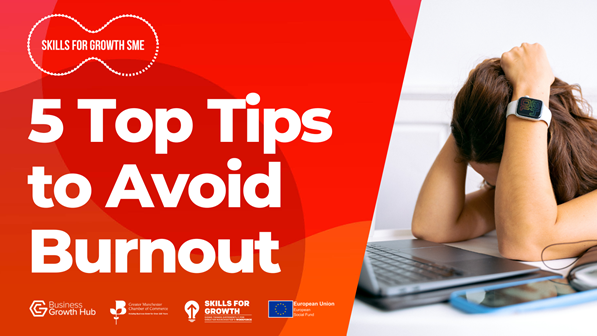Marketing Apprentice on the Skills for Growth - SME Support programme.

5 Top Tips to Avoid Burnout
Burnout can be described as exhaustion or a lack of ability to cope with stressors. An early 2022 survey showed that burnout has increased by 9% since the start of the pandemic. Burnout isn’t only about your job; it’s about your personal life, maintaining personal relationships, and keeping your brain strong. Below are some top tips you can use to avoid the concept of burnout.
Take Breaks
A big component of burnout is not knowing when to stop. It’s easy to sit in front of the screen all day, which makes taking screen breaks more important than ever. By taking micro-breaks, five or ten minutes, throughout the workday helps you unwind and reset your energy level. After hours of sitting, taking short breaks are an effective way to manage your energy levels as well as preventing headaches, eye strains and muscle aches.
A simple rule to follow to ensure you’re taking breaks when you should, is the 20-20-20 rule. This rule dictates that for every 20 minutes of screen time, you should look away at something 20 feet away for 20 seconds.
Stick to a Routine
Creating and sticking to a schedule will help you to become more organised and therefore relieve the stress of feeling like you are constantly playing catch-up. Although it may seem contradictory, doing the same thing repeatedly every day can actually be an effective way to avoid burnout.
A good place to start would be creating a morning schedule. Give yourself enough time to wake up, get ready, do some stretches, perhaps go for a quick walk and so on. This will prevent the stress of waking up late and rushing in the morning, setting you up for a stressful day. It will also give your mind time to breathe and prepare for the day ahead, as taking time to do stretches or go for a brief walk allows your mind and body to “wake up” in a sense.
Switch up your Environment
Something that is particularly true of working from home is being stuck in one place all day on your computer. It doesn’t take long for you to become bored and even sick of constantly being in the same environment for so long. Discover whatever your favourite outdoor activity may be, and take breaks during the day to do it. Just by going for a 15 minute walk, you give your mind time to take a breather from work, and refresh yourself by being in nature and soaking up the environment.
Avoid Overstimulation
It can be overwhelming having a list of tasks you need to complete, and feeling like you’re are ticking none of them off. It is important not to panic and rush everything you do throughout the day. This includes what you do in your free time such as taking your lunch break. Working whilst eating can become a bad habit as you lose that important block of time in the middle of the day to help you reset for the latter part of the day. Instead, slow down and eat in peace, taking your mind off work for the entirety of your lunch break. To help you switch your brain off from work in the evening, try reading a book, even if it’s just for 15 minutes as this will help you deal with feelings of overstimulation from work.
Communicate and Offer Support
If you’re a people manager, be open to conversations about mental health. Offer employees alternate arrangements, time to decompress, or even just a friendly face and words of encouragement. You could also spruce up the office with food, entertainment, and positive vibes to give employees a place to get away from the stressors of their home office. Offering additional benefits such as half-day Friday’s and flexible working hours will help employees to feel well rested and appreciated.
Skills for Growth – SME Support can help you upskill your employees and examine your organisational structure to identify any skills gaps within your team. Click here to apply for our fully funded support service or call 0161 237 4444 and speak to a Skills Coach today.
